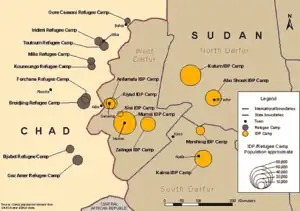| UN Security Council Resolution 1679 | ||
|---|---|---|
 Refugee camps near the Chad–Sudan border | ||
| Date | 16 May 2006 | |
| Meeting no. | 5,439 | |
| Code | S/RES/1679 (Document) | |
| Subject | The situation in Sudan | |
Voting summary |
| |
| Result | Adopted | |
| Security Council composition | ||
Permanent members | ||
Non-permanent members | ||
| ||
United Nations Security Council Resolution 1679, adopted unanimously on May 16, 2006, after recalling resolutions 1556 (2004), 1564 (2004), 1574 (2004), 1590 (2005), 1591 (2005), 1593 (2005), 1663 (2005) and 1665 (2006) on the situation in Sudan, the Council endorsed a decision by the African Union Peace and Security Council to move ahead with a United Nations peacekeeping force in Darfur as soon as possible.[1]
After the adoption of Resolution 1679, China said it would not support any further resolutions against Sudan under Chapter VII authority, unless approval of the Sudanese government was obtained.[2]
Resolution
Observations
In the preamble of the resolution, the Council expressed concern over the consequences of the prolonged conflict in Darfur on the civilian population and reiterated that all parties had to end the violence immediately. There was also concern that the conflict may affect the rest of Sudan and neighbouring Chad, with the Council noting the deteriorating relations between the two countries.
Meanwhile, the members of the Council commended political efforts to resolve the crisis in Darfur led by the African Union. Furthermore, the efforts of the African Union Mission in Sudan (AMIS) were welcomed, despite "exceptionally difficult circumstances". The Council envisaged a follow-on United Nations operation in Darfur with African participation.[3]
Acts
Acting under Chapter VII of the United Nations Charter, the Council called upon parties to the Darfur Peace Agreement to respect commitments they had made and immediately implement the agreement, while those that had not signed the agreement were urged to do so.[4] It expressed its intention to consider sanctions against any party or individual that would obstruct the implementation of the agreement.
The African Union was asked to consult with the United Nations, international organisations and countries on measures to strengthen AMIS's capacity to enforce security arrangements from the Darfur Peace Agreement, while endorsing the African Union's decision to transform its operation into a United Nations operation. All decisions relating to the new operation would be discussed with those party to the peace agreement.
Finally, the resolution requested the Secretary-General Kofi Annan to submit recommendations on the mandate, structure, strength, cost and potential participants of the United Nations operation in Darfur, within a week of an assessment mission returning.[5]
See also
References
- ↑ "Security Council endorses African Union decision on need for concrete steps in transition to United Nations operation in Darfur". United Nations. May 16, 2006.
- ↑ Black, David Ross; Williams, Paul (2010). The international politics of mass atrocities: the case of Darfur. London: Taylor & Francis. p. 181. ISBN 978-0-415-55902-7.
- ↑ Matthews, Max W. (2008). "Tracking the Emergence of a New International Norm: The Responsibility to Protect and the Crisis in Darfur". Boston College International and Comparative Law Review. 137 (1): 137–152. ISSN 0277-5778.
- ↑ McCormack, T.; Kleffner, J. K. (2009). Yearbook of International Humanitarian Law, Volume 9; Volume 2006. The Hague: T.M.C. Asser Press. p. 296. ISBN 978-90-6704-269-7.
- ↑ "UN begins Darfur peacekeeper move". BBC News. 16 May 2006.
External links
 Works related to United Nations Security Council Resolution 1679 at Wikisource
Works related to United Nations Security Council Resolution 1679 at Wikisource- Text of the Resolution at undocs.org